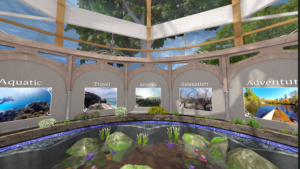How virtual reality is transforming dementia care in Australia
 There are currently more than 353,800 Australians living with dementia, according to Australian Institute of Health and Welfare statistics.
There are currently more than 353,800 Australians living with dementia, according to Australian Institute of Health and Welfare statistics.
For people living with dementia, VR can offer relief by triggering memories and positive emotions, even for those in the later stages who are often responsive to very little.
Build VR, a Victoria-based company that specialises in VR, virtual tours, and 360-degree video and photography, recently released their Solis VR unit, a Gear VR handset for care homes that marks a big step forward in the quality of care for those living with dementia in Australia.
These facilities — they're kind of out of sight, out of mind. They're beautiful facilities but the residents are bored."
"Our first demonstration was about 18 months ago," Pascal said. "We went to a facility, we had a dozen residents try it and most of them had dementia — we didn't know that before we arrived. So everyone was a bit apprehensive as to what the reaction would be, but the reaction was amazing. All the staff loved it and it pretty much became a hit, because we have all these residents now communicating with each other, talking about what they're seeing and even sharing some stories.
Those five VR experiences now form the five categories of video scenarios that the handset offers users: Travel, adventure, animals, aquatic, and relaxation.
"Another thing we did was figure out how to sync a tablet with the headset, so a staff member can actually see what the resident is experiencing in real-time — that's proven very popular too, they can help guide them and see what they like and what they don't like."
"In terms of dementia residents it's more about how they're behaving before they try it," he said. "There's one woman in particular I remember: She had been making a repetitive moan every few seconds and was really not reacting to anything. We got her to try Solis and within about 10 seconds she just stopped, she was just fixated with what was she was experiencing, which was a canoe trip. She didn't [make the noise] again until I left. And she was in high-care."
"There are a lot of technophobes in this world and a lot of them are carers," Pascal said. "When they first see the tech they're a bit intimidated, and once they get used to it, they love it.
Alzheimer's Australia, which estimates that 1.2 million people are involved in the care of a person with dementia, has taken a slightly different route to improve dementia care through the use of VR. Rather than an experience tailored to the person with the condition, Alzheimer's Australia Vic last month released a free app in collaboration with Deakin University that allows anyone with a smartphone and Google Cardboard to see through the eyes and experience the challenges of a person living with dementia.
See the full story here: http://www.techrepublic.com/article/how-virtual-reality-is-transforming-dementia-care-in-australia/
Pages
- About Philip Lelyveld
- Mark and Addie Lelyveld Biographies
- Presentations and articles
- Tufts Alumni Bio